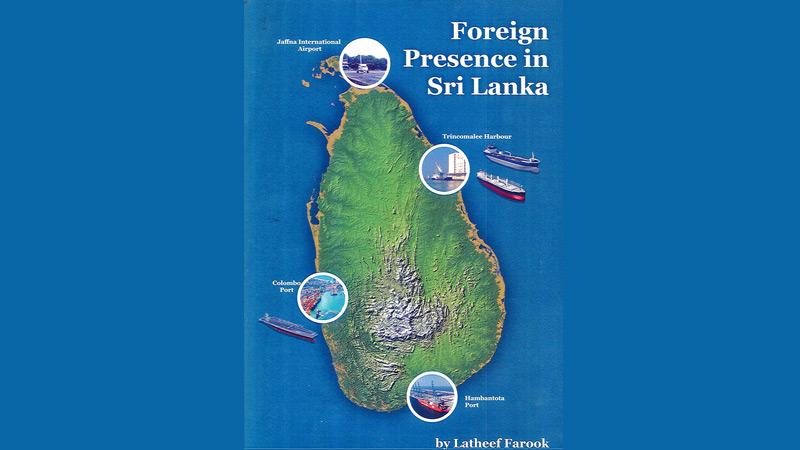
Title: Foreign Presencein Sri Lanka
Author: Latheef Farook
Publisher: Sri Lankan Journalists for Global Justice
Sumptuously produced yet scholarly, ‘Foreign Presence in Sri Lanka’ written by Latheef Farook covers developments in the country up to November 16, 2019 Presidential elections. The author began his journalistic career with the now defunct Independent Newspapers in1966 before joining Lake House in 1971.
He worked for the Ceylon Daily News and Evening Observer. He also worked for Khaleej times and Gulf News. He has also written many books on Muslim affairs in Sri Lanka and foreign countries.
 Sri Lanka, described as a Paradise Island and the Pearl of the Indian Ocean was a shining example for the newly emerging third world countries as far as political, economic and social stability, communal harmony and peace were concerned. The island’s GDP growth in the Asian region was second only to that of Japan. It had all the political, economic and social ingredients with a literate population to move ahead. However, the majority community failed to produce a leader who could think for the whole country instead of promoting the narrow interests of a section of society.
Sri Lanka, described as a Paradise Island and the Pearl of the Indian Ocean was a shining example for the newly emerging third world countries as far as political, economic and social stability, communal harmony and peace were concerned. The island’s GDP growth in the Asian region was second only to that of Japan. It had all the political, economic and social ingredients with a literate population to move ahead. However, the majority community failed to produce a leader who could think for the whole country instead of promoting the narrow interests of a section of society.
Short-term interests
According to the author, this was done for political gain or for short-term interests without thinking of its repercussions on the country. As a result, people have been compelled to pay the price for the shortsighted policy. They had to face a long-drawn battle which caused deaths and destruction. The Government also had to quell an insurrection. The end result was suspicion, bitterness and hatred among the communities. The once prosperous, peaceful and promising island remains one of the most mismanaged countries in the world.
Referring to the island’s foreign policy, the author says the country played a dynamic role under Sirimavo Bandaranaike’s non-aligned policy. Sri Lanka became the venue for the Non-aligned Summit in 1976. Heads of States from newly independent countries in Asia, Africa and Latin America arrived in Colombo for the summit giving the country a publicity boost. However, the Non-alignment Movement lost its force due to the emergence of rival world powers.
Soon after the battle, many world powers approached the island with their own agendas. Two Asian powers – India and China – entered the fray while a distant country like the United States has also shown its interest in the island’s affairs. The chapters on ‘Sri Lanka: strategic hub of the Indian Ocean’, ‘China-Pakistan economic corridor and growing rivalry in the Indian Ocean’ and ‘Presence of powers and its impact on Presidential Elections’ throw more light on the issue.
It is a foregone conclusion that Sri Lanka’s strategic position in the Indian Ocean has become more pronounced with the increase of trade relations. Madagascar, Mauritius and the Maldives have not received such a position. Natural harbours and developed infrastructure facilities have enhanced the island’s strategic position.
Trading relations
The author says the rise of China as an economic and military power in East Asia and the consequent trading relations with countries around the world have resulted in a remarkable change of American military policy during crucial times such as elections. Former US President Barak Obama’s policy of ‘Pivot to Pacific’ was aimed at containing the expanding economic and military relations of China in the region.
During the latter part of the Cold War, the American policy of strategic partnership with China changed into a more aggressive confrontation notwithstanding strong trading activities between the two countries. According to a newly published document of the Pentagon on the Indo-Pacific Strategy, it is clear that it intends establishing and maintaining dominance over the Indian Ocean.
The harbour built with Chinese aid in Hambantota has mired in controversy. The Government had to lease the port and a vast land area to China confirming the worst fears of the United States and India. Geopolitics has undergone vast changes and new alliances are being forged. Against such a background, the country is in need of a leader who could think for the whole country and move ahead.
Some of the assumptions and arguments put forward in the book may be controversial. However, Latheef Farook has brought out a readable book.
The writer is a freelance journalist and Indologist based in Hyderabad, India
